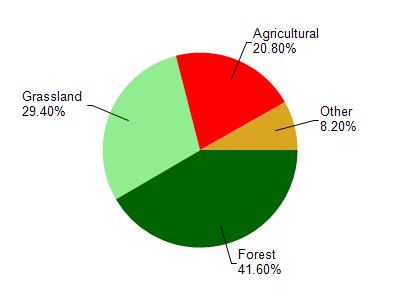Grant
No
Yes
No
Fish and Aquatic Life
Overview
Doc Smith Branch (Cass Valley Creek) is a spring-fed, Class II trout stream tributary to Fennimore Fork and is
considered an exceptional resource water (ERW). Baseline monitoring was conducted on the
stream in 2000. The trout population, which has significant population fluctuations, is
possibly being limited by nonpoint source water pollution specifically from cropland erosion
and poor manure storage and handling. Other potential sources of nonpoint pollution include
heavy grazing, cattle access to the stream, and barnyards near the stream. As a result, the
stream is considered a high priority for nonpoint source pollution reduction. The state has
some easements on Doc Smith Branch where the stream meets Castle Rock Creek.
From: Ripp, Coreen, Koperski, Cindy and Folstad, Jason. 2002. The State of the Lower Wisconsin River Basin. PUBL WT-559-2002. Wisconsin Department of Natural Resources, Madison, WI.
Date 2002
Author Cynthia Koperski
Historical Description
Doc Smith Branch is a spring-fed, Class II trout stream (WDNR, 1980) tributary to Fennimore Fork. It has also been nominated for ERW status. The trout population, which has significant population fluctuatiions, is possibly being limited by nonpoint source water pollution (Kerr, 1991). Nonpoint sources of water pollution in the subwatershed include heavy grazing, cattle access to the stream, and barnyards near the stream (Kerr ,WDNR, 1991, Morton, 1991-1992). Manure storage and handling has been a problem with at least one Notice of Discharge (NOD) having been issued by the department for cleanup and management practices installation (WDNR 1991)
Date 1994
Author Surface Water Inventory Of Wisconsin
Historical Description
From: Smith, Tom D., and Ball, Joseph R., Lake and Stream Classification Project. Surface Water Resources of Grant County, Department of Natural Resources, 1972.Surface Area = 2.91 acres, Length = 4.0 miles, Gradient = 23 ft./mile Flow = 3.5 c.f.s.
One of the main spring-fed tributaries to Fennimore Fork entering from the south one mile west of Castle Rock. This stream is sometimes called "Doc. Smith Branch". Trout water extends upstream from the mouth 1.75 miles. Fingerling and yearling brown trout are stocked annually by the Department of Natural Resources. Some natural reproduction may occur. A few brook and rainbow trout are present. A total of 1.1 miles of stream easement has been acquired by the state based on the excellent water quality, good food production, and a high potential for improvement. A water control structure is scheduled to be constructed on an intermittent tribu- tary as part of the Blue River P.L. 566 Watershed Project. This project when completed should help increase the trout carrying-capacity of the stream. Some habitat protection has been done by the Department of Natural Resources by riprapping eroded stream banks near the juqction with Fennimore Fork. Muskrats and upland game species are found throughout the area. Public access is provided by the area under stream easement and one bridge crossing. Seven dwellings adjoin the stream.
Date 1972
Author Surface Water Inventory Of Wisconsin
Condition
Wisconsin has over 84,000 miles of streams, 15,000 lakes and milllions of acres of wetlands. Assessing the condition of this vast amount of water is challenging. The state's water monitoring program uses a media-based, cross-program approach to analyze water condition. An updated monitoring strategy (2015-2020) is now available. Compliance with Clean Water Act fishable, swimmable standards are located in the Executive Summary of Water Condition in 2018. See also the 'monitoring and projects' tab.
Reports
Management Goals
Wisconsin's Water Quality Standards provide qualitative and quantitative goals for waters that are protective of Fishable, Swimmable conditions [Learn more]. Waters that do not meet water quality standards are considered impaired and restoration actions are planned and carried out until the water is once again fishable and swimmable
Management goals can include creation or implementation of a Total Maximum Daily Load analysis, a Nine Key Element Plan, or other restoration work, education and outreach and more. If specific recommendations exist for this water, they will be displayed below online.
Monitoring
Monitoring the condition of a river, stream, or lake includes gathering physical, chemical, biological, and habitat data. Comprehensive studies often gather all these parameters in great detail, while lighter assessment events will involve sampling physical, chemical and biological data such as macroinvertebrates. Aquatic macroinvertebrates and fish communities integrate watershed or catchment condition, providing great insight into overall ecosystem health. Chemical and habitat parameters tell researchers more about human induced problems including contaminated runoff, point source dischargers, or habitat issues that foster or limit the potential of aquatic communities to thrive in a given area. Wisconsin's Water Monitoring Strategy was recenty updated.
Grants and Management Projects
Monitoring Projects
| WBIC | Official Waterbody Name | Station ID | Station Name | Earliest Fieldwork Date | Latest Fieldwork Date | View Station | View Data |
|---|
| 1212000 | Cass Valley Creek | 10054259 | Cass Valley Cr-Doc Smith Br US crossing of Cass Valley Rd | | | Map | Data |
| 1212000 | Cass Valley Creek | 10058201 | Cass Valley Creek at Preston Rd | | | Map | Data |
|

Watershed Characteristics
Cass Valley Creek is located in the Blue River watershed which is 216.19 mi². Land use in the watershed is primarily forest (41.60%), grassland (29.40%) and a mix of agricultural (20.80%) and other uses (8.20%). This watershed has 513.46 stream miles, 416.83 lake acres and 5,825.06 wetland acres.
Nonpoint Source Characteristics
This watershed is ranked High for runoff impacts on streams, Not Ranked for runoff impacts on lakes and High for runoff impacts on groundwater and therefore has an overall rank of High. This value can be used in ranking the watershed or individual waterbodies for grant funding under state and county programs.However, all waters are affected by diffuse pollutant sources regardless of initial water quality. Applications for specific runoff projects under state or county grant programs may be pursued. For more information, go to surface water program grants.